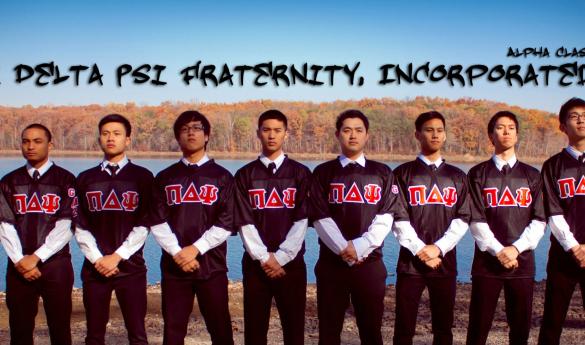Mason’s first-ever Asian American fraternity initiated
Pi Delta Psi was recently initiated as Mason’s first Asian-American cultural fraternity chapter.
Considering that Mason has eight cultural interest sororities and fraternities, including one Asian-American interest sorority, the fraternity’s founders reasoned that Mason needed an Asian-American cultural fraternity.
“It really didn't make sense for there to be a gap missing in the space for Asian-Interest Fraternities,” JS Ham, a founding brother of Mason’s Pi Delta Psi, said in an email.
Pi Delta Psi came from an interest group that its founding brothers named “F-Cubed,” an abbreviation of “From Friends to Family.” Formed in December 2010, it took 23 months for F-Cubed to become established as Mason’s colony of Pi Delta Psi, the first phase in becoming an initiated chapter.
“We had the task of coming up with a name and trying to adapt to the regular activities and requirements of a fraternity without any guidance or older brothers to help us initially,” Ham said in an email.
Pi Delta Psi became a chartered Asian-American cultural fraternity at Mason on Nov. 17, 2012.
The charter members of Pi Delta Psi were leaders chosen from a variety of different cultural organizations including the Korean-American Student Association, the Filipino Student Association, the Vietnamese Student Association and the Asian Pacific American Coalition.
“The last thing we wanted was to be another ‘clique’ of the GMU community,” Ham said in an email. “Rather, we strived to be a group of strong leaders of the community who brought together the organizations behind the scenes to emphasize integration and togetherness.”
The fraternity endeavors to incorporate a sense of identity with academic and career success.
“Above all, Pi Delta Psi hopes to advocate love, brotherhood and most importantly Asian culture through the pillars of academic achievement, cultural awareness, righteousness and loyalty,” Ham said in an email.
Members contribute to the community by volunteering at an after-school children’s tutoring center and by holding offices in Asian culture organizations.
“We cannot move forward without knowing where we came from,” Ham said.

